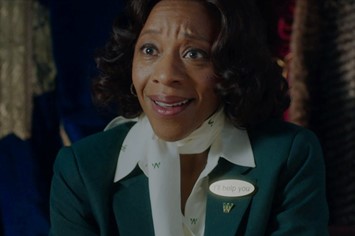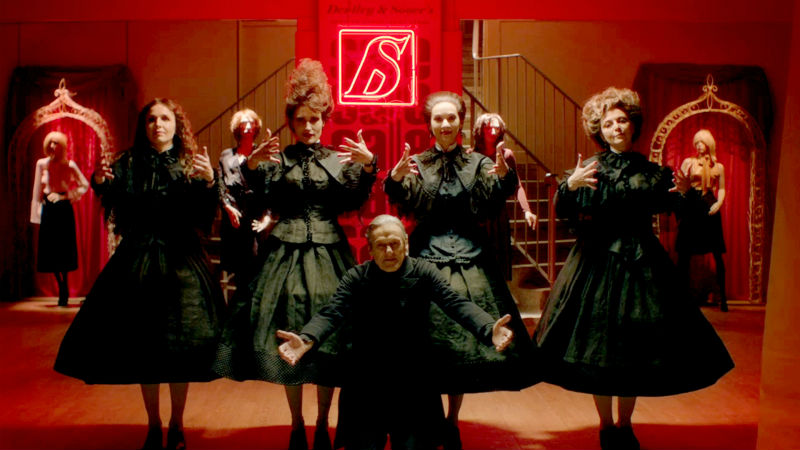In Fabric: A wonderful film that is regrettably stitched to a less wonderful one
By Chase Hutchinson
I had the opportunity to see the film In Fabric before it's release in December and was thoroughly moved by it. It was a journey that I was completely invested and entranced with. Unfortunately, the spell was broken when the narrative focus shifts from the protagonist of Shelia (or who at least I thought would be the protagonist) to other characters that cannot hold a candle to the story that came before it.
I won't disclose why this is until clearly marked that I will be discussing the entire narrative (the film doesn't come out for another couple months after all). However, suffice it to say that for the rest of the film, one which inexplicably cuts her out of the narrative, it felt aimless and lost until the finale.

This isn't meant to be overly negative, the entire performance from Marianne Jean-Baptiste and the way her character progresses makes it so that everything that follows it was almost impossible to live up to the tone that her story set. Shelia is a complex and compelling character. The audience is first shown her behind a glass window working at bank and she is crying without us understanding why. We see her pull herself together and return to work.
From this initial moment, there is already so much depth to what is going on. It is subtle in how it reveals information and earns all the investment in seeing her character struggle to get by. The ensuing journey we take with her is a humorous one that also packed a surprisingly emotional punch because of the strong central character who unfortunately should have remained as such.
What is this even about?

At it's most straightforward, this is the story of a red dress that haunts and terrorizes whoever is unfortunate enough to come across it. Shelia finds herself desiring to meet new people after her husband has left her and decides to buy a dress for an upcoming date. She goes to find a good deal on sale, of which there have been many commercials eerily advertising in haunting and strange music that feels hypnotic, only to stumble upon more than she bargained for in a beautiful red dress.
Convincing her to get the dress is the fantastically strange Miss Luckmoore, played brilliantly by Fatma Mohamed, who delivers every strange line with an eerily commanding tone which is both hilarious and horrifying. It is from there that Shelia is convinced and buys the dress. It then begins to slowly but surely tear apart the fabric of her life. As is common in horror films, no one believes her and she is left by herself to deal with the dress. That this was not made the rest of the story is incredibly unfortunate.
This is because Shelia is a great muse that would have been wonderful to explore. The building up of her character feels anything but customary. She is lonely and attempting to get by even as most of the people in her life don't value her. The scenes with her son articulate and flush this out so clearly that I was cringing in my chair at the awkward yet painfully honest scenes. When she is no longer the focus of the story, the story dramatically suffers for it.
The retail coven run by Miss Luckmoore in the background is also wonderful. The rituals they undertake are appropriately strange and recall Suspiria only with more absurdity. There is a steady hand guiding the story and everything in that first portion of the narrative is near perfect in its execution. This film is worth seeking out for this alone even if it, unfortunately, doesn't stick the landing.
On all technical levels used to build the world, the film is well constructed with no stitch out of place. The score compliments every scene and the harsh cuts often serve to disorient to the film's benefit. Even in the scenes where the dress moves around by itself (which made me think of Attack of the Killer Tomatoes) I was riveted by the way it would slowly sneak up to its victims. There is a brief scene that pulls back the curtain to explain some of this spell and that is all that is needed.
Beyond that, the story has an interesting thread about consumer culture. The line Miss Luckmoore delivers asking, "Did the transaction validate your paradigm of consumerism?" is silly but when combined with the way the commercials are positioned serves as a sneaky commentary on the nature of our desire to buy. It feels good to buy things, and the film doesn't look down on people for doing so. Shelia wants to buy a dress to impress her date and it largely works, leaving us with a fleeting feeling of joy for her. That it comes at such a cost to her makes it all the more fleeting and impactful.
WARNING: SPOILERS AHEAD
This is where it loses the plot
Shelia dies in a car accident. It's quick and painful, leaving a lasting impact in the narrative. For all of about five minutes. Shelia's death was tragic and appropriately played out. To have her finally be turning her life around only for it all to be cut short is brutal. The scene of her son not picking up the phone because he still remains too self-obsessed is all the worse.
The reveal that her death leaves her trapped down in the underground of the department store made me sit back up and hunger for more of her world there. However, that isn't what we get. Instead, the focus shifts to characters I haven't mentioned as they don't show up substantially in the trailer (save for brief flashes) and that is where the rest of the film is spent to it's detriment.
This decision feels incredibly out of place

The introduction of two new characters that also then come upon the dress is a strange one though not terribly uncommon in horror. It shows how the haunted item can continue to haunt those who come upon it. This shift towards convention is disappointing when the film had been breaking convention up until this point.
This becomes especially true when the characters that get introduced are devoid of any compelling components especially in comparison to the narrative we were focusing on prior. They simply just are there and left me feeling confused about why they were included. Did Jean-Baptiste have another project to do? It feels like she just had to go and the writer, along with the film, had to scramble to recover.
In addition, it feels repetitive. We have seen all of the haunting elements before and the film just does them again. This may be an attempt to build tension, but all I could think about was how much I wish the rest of the film had been about Shelia attempting to figure out what happened to her.
To see a great film fall so far is disappointing, but I do appreciate the way it all wraps up. I may revisit this come December after I see it again but the film regrettably is a great case of wasted potential.
